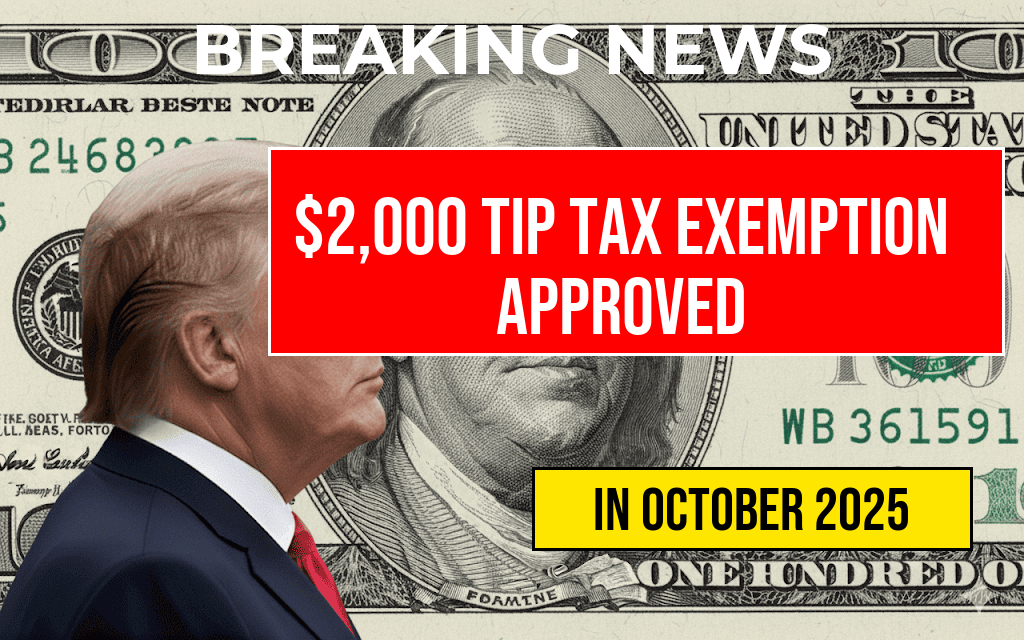Legislation officially approved last week will soon exempt tips exceeding $2,000 from federal income tax, a move that could significantly reshape tipping practices across the hospitality industry. The new law, which passed with bipartisan support, aims to alleviate the tax burden on high-earning service workers while prompting a reevaluation of how tips are reported and taxed. Industry experts predict this exemption could influence employee income strategies, employer reporting protocols, and the broader landscape of tip transparency. As the law gears up for implementation, both workers and businesses are preparing for a period of adjustment that may have ripple effects on payroll management, tax compliance, and customer tipping behavior.
Details of the Legislation
The legislation, titled the Tip Exemption Act of 2024, was introduced earlier this year amid concerns over the taxation of large, often unpredictable tip amounts. Under current IRS regulations, all tips are considered taxable income, requiring reporting and withholding regardless of the amount. The new law, however, creates an exemption for tips exceeding $2,000 per calendar year, effectively allowing qualifying workers to avoid paying federal income tax on those amounts. This exemption applies to tips received directly from customers as well as those pooled through employer-managed tip-sharing arrangements.
Key Features of the Law
- Threshold Amount: Tips exceeding $2,000 are exempt from federal income tax.
- Applicability: Applies to employees in the hospitality, food service, and personal care sectors.
- Reporting Requirements: Employers remain responsible for reporting tips below the exemption threshold, while workers are encouraged to maintain accurate records of their earnings.
- Implementation Date: The law takes effect at the start of the 2025 tax year, giving employers and employees time to adapt systems and practices.
Implications for Workers and Employers
The exemption holds the potential to substantially benefit high-earning service workers, many of whom rely heavily on tips as a significant portion of their income. By removing the tax burden on large tip amounts, workers can retain a greater share of their earnings, which could influence their financial planning and savings strategies. Conversely, the change might complicate wage reporting and tax compliance for employers, who will need to adjust payroll processes to account for the exemption while ensuring adherence to IRS guidelines.
Potential Industry Impact
| Aspect | Expected Outcome |
|---|---|
| Worker Income | Increased take-home pay for high-tipping employees, possibly leading to higher job satisfaction |
| Employer Reporting | Greater complexity in payroll systems to accurately track and report tips |
| Tax Revenue | Potential short-term decline in federal tip-related tax collections, though overall revenue may stabilize with compliance |
| Customer Behavior | Possible shifts in tipping patterns, with some customers increasing tips to maximize benefits |
Legal and Policy Context
The law builds on ongoing debates about tip transparency and fair taxation. Critics argue that the current system discourages full tip reporting, contributing to tax evasion and income inequality among service workers. Proponents contend that the exemption provides relief for workers at the higher end of the tipping spectrum, aligning tax policy more closely with actual income variations in the industry. For additional context, the Wikipedia entry on U.S. taxation offers detailed background on federal tax structures, including tips.
Next Steps and Industry Response
As the legislation moves into its implementation phase, stakeholders are preparing for a period of transition. Employers are updating payroll software to incorporate the new exemption, while industry associations are issuing guidance to ensure compliance. Many high-earning service workers are optimistic about the potential financial benefits, while some smaller operators express concern over the administrative burden and the need for clear compliance protocols.
Legal analysts suggest that additional regulations or clarifications may follow to streamline reporting procedures and prevent abuse. Meanwhile, consumer behavior remains unpredictable; some experts anticipate that awareness of the tax exemption might influence tipping habits, potentially prompting increased gratuities among patrons seeking to maximize their benefits.
For further information on tax policy developments and industry impacts, reputable sources such as Forbes and the IRS website provide ongoing coverage and updates.
Frequently Asked Questions
What is the main purpose of the Two-Thousand-Dollar Tip Tax Exemption legislation?
The legislation aims to exempt tips up to $2,000 from taxable income, providing financial relief to service workers and simplifying tax compliance related to tip reporting.
When does the Two-Thousand-Dollar Tip Tax Exemption legislation take effect?
The legislation is set to become effective starting from [insert specific date], allowing eligible workers to benefit from the exemption during the upcoming tax season.
Who qualifies for the Tip Tax Exemption under this legislation?
Qualified individuals include service industry employees such as waitstaff, bartenders, delivery drivers, and other workers who receive tips as part of their income.
Are there any limitations or conditions associated with the exemption?
Yes, the $2,000 exemption applies per individual and is subject to verification. It does not exempt tips exceeding this amount from taxation.
How might this legislation impact tax filing for service workers?
Service workers will need to report their tips accurately, but the $2,000 exemption will reduce their taxable tip income, potentially lowering their tax liability.






